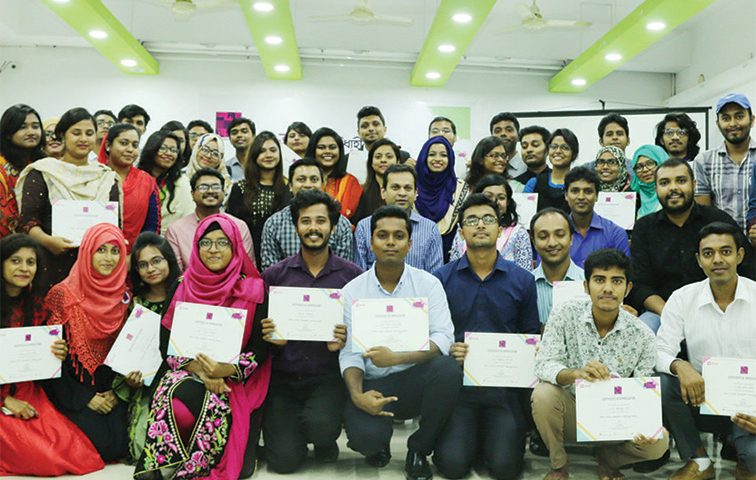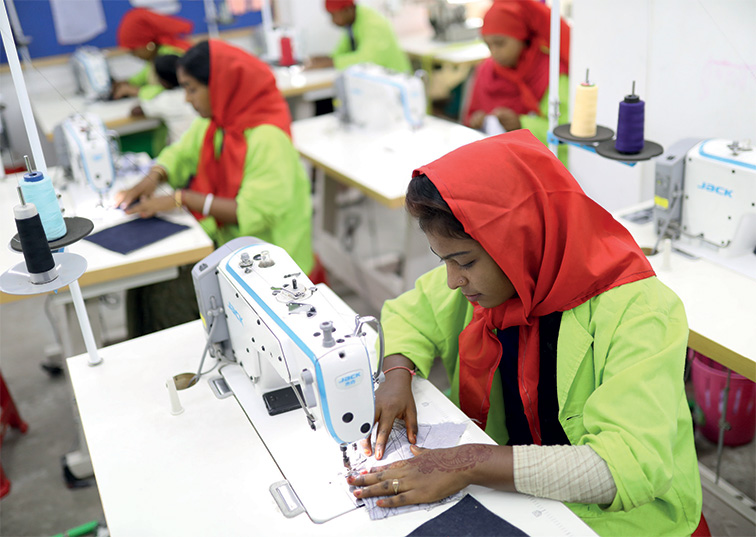We believe in the power of youth

Tapping into the youth force the right way
March 24, 2019
Channeling the power of youth in low-income urban settlements
March 24, 2019We believe in the power of youth

There are 1.8 billion young people – yes, I’m talking about one-fourth of the world’s population. Leave out this population when making the next big decision in building a better world, and you will very likely end up missing it altogether.
Whenever, we hear discussions regarding the youth, they are reflected as the unruly and unmanageable population looking for instant gratification.
Now let me divert your attention to Bangladesh, a small country in South Asia with 164 million people. One-third of the population is, you guessed it right, the youth. In a nation that has a rich culture and history, it is the youth that have always led major socio-political transformations – from the language movement of 1952 to the Liberation War of 1971, and followed by a number of major uprisings – all spurring positive change.
However, there were dark times too that shook us to the core. 1 July 2016, the Holey Artisan attack. What started just like any other day ended in a way that left the entire country grappling with countless questions. What could have led these youngsters from mostly privileged tiers of the society conduct such an act of inhumanity? What is going so wrong with the young generation? Are we failing them? If yes, how do we take action?
The reality is, the youth are not only underestimated and under- represented, but also widely misunderstood.
At BRAC, we believe in taking a deep dive into problems, extracting insights from what people are thinking, and co-creating solutions with communities. When the end goal came down to understanding young people, we decided to add another parametre: making their voices heard.
We listened
We formed groups within the organisation and spread out to different districts of Bangladesh. Our goal was to listen to the stories of young people and try to understand what mattered to them. We also talked to school children, parents, teachers, and organisations working in the youth space to get a better understanding of the ecosystem. A wide range of issues cropped up: parental negligence and overprotectiveness, lack of a trusted platform to share mental health crises, involvement in drugs providing an easy escape from reality, tailored information gap to personal and professional development, lack of local role models and lack of opportunities to engage in passion-driven activities.
Helping the youth to help themselves
According to the Bangladesh Bureau of Statistics (BBS), an estimated two million young people enter the labour force every year. But youth unemployment in Bangladesh has been rising in the past 25 years, from four per cent in 1991 to 10.4 per cent in 2016, according to the International Labour Organization (ILO). And the public and private sectors are able to provide jobs to not even one-fourth of this total potential workforce. So what happens to these young people? Knowing the uncertainty of their future, what mechanism do they adopt to prepare themselves from earlier years? Additionally, in a highly centralised development ecosystem, how do local youth foresee their future?
At BRAC we knew addressing these issues was not a one-time, quick solution. It’s a complex environment with immense pressure of competition and the only way we could see light at the end of the tunnel was to create a platform where young people themselves can openly address their concerns and realities, relate to their areas of passion, and come up with a path to pave their journey forward. Our role, in this picture, was only to guide and mentor them to write and live their own story.
Hence in 2018, we started a pilot initiative with a group of 30 young people from diverse backgrounds in Khulna city with a lean model: capacity development sessions, community projects for idea implementation, and regional events to showcase their achievements.
Not just another skills development initiative
Amra Notun Network, a network for young changemakers, provides an engagement and development platform for youth to drive positive change in their communities. The model focuses on equipping local changemakers with mentoring skills so they can influence and create future mentors in their localities. So, how are we making this happen?
We are giving young participants access to a unique blend of high-quality learning curriculum,which balances 21st century functional skills with awareness of social issues. Functional skills are taught through the lens of social and emotional learning and human-centred design approach to help youth maximise their individual potential as citizens of tomorrow. Built on a strong foundation of open and collaborative culture, our model brings in a range of committed partners to support programme implementation through innovative learning mechanisms like storytelling, drama therapy, and mindfulness practices. The Amra Notun Network prioritises creation of scope for participants to showcase their unique strengths and skill sets through community engagement projects.
Local change depends on the power of communities, hence we are building one
Since July 2018, we have reached 98 young people located in Khulna city. They are now working in small groups on their ideas for change.
Fairooz reflecting on her experience said, “There was a point when I looked at problems and felt bad about the system. But now I believe in taking charge of my problems and focusing on execution.”
Another participant, Ragib, shared, “Last year, I was going through an endless series of frustrations and I did not know who to talk to. After Amra Notun’s engagement, my teammates and I have been working on a platform for many more like me in our universities. It is an open space to talk about mental health battles without fear of judgment. I want to help myself by helping others.”
We acknowledge there is no silver bullet to end social problems and there is no one- size-fits-all solution. Hence, this platform is for creating diverse opportunities in the communities. Some participants are getting the scope to engage as training facilitators with us, some are discovering their entrepreneurial interests and others are preparing for the formal job sector. Our focus is to help them choose and work on their areas of interest with a lens of social responsibility. In future, we foresee this network taking off on its own, and be run and managed by the participants and alumni of the network themselves.
The youth not only carry a nation through a transformational process but they also decide the transformation. And these decision makers need our support and guidance to achieve their goals for a future that works for them. We need to stop looking at them as problems that need solution or tools to achieve predefined agendas. They need us to believe in them, they need mentors to look up to, and most importantly, they need an ecosystem. But we do not want to do this alone. So, if you believe in the power of youth, join us on this journey – it can only mean progress for all!
Rakib Avi leads BRAC Social Innovation Lab – a knowledge and experimentation hub within BRAC. He manages a portfolio of projects including mobile financial systems for women, digital tools for development, youth inclusion and incubating emerging social enterprises.
Riff at Ashrafee is a deputy manager at BRAC Social Innovation Lab. She leads the youth incubation team. Her team drives the youth pilot intervention called Amra Notun Network, a platform designed to foster and promote positive youth engagement in Bangladesh.

